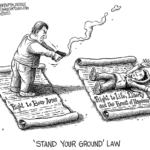 Florida Governor Rick Scott has signed legislation into law that essentially shifts the burden of proof from defendant to prosecutor in “Stand Your Ground” cases. This is a significant shift in the law since prior to this bill’s signing the Florida Supreme Court had ruled in 2015 that defendants have to prove in pretrial hearings that they were defending themselves in order to avoid prosecution on charges for a violent act. Prosecutors fought the bill claiming that it will make their job much tougher to convict people who commit violent acts and then claim self-defense.
Florida Governor Rick Scott has signed legislation into law that essentially shifts the burden of proof from defendant to prosecutor in “Stand Your Ground” cases. This is a significant shift in the law since prior to this bill’s signing the Florida Supreme Court had ruled in 2015 that defendants have to prove in pretrial hearings that they were defending themselves in order to avoid prosecution on charges for a violent act. Prosecutors fought the bill claiming that it will make their job much tougher to convict people who commit violent acts and then claim self-defense.
Since the Florida Supreme Court ruling in 2015, Florida Republicans have sought to shift that burden of proof.
The Republicans sought a law that protects a defendant’s constitutional right that presumes they are innocent until proven guilty. But opponents said it will embolden people to shoot to kill, and then claim self-defense knowing that the only witness against them can no longer testify.
Only four of the other 21 states with “stand your ground” laws mention burden of proof — Alabama, Colorado, Georgia and South Carolina — and all place it on defendants.
Many states have long invoked “the castle doctrine,” allowing people to use deadly force to defend themselves in their own homes. Florida changed that in 2005, so that even outside a home, a person has no duty to retreat and can “stand his or her ground” anywhere they are legally allowed to be. Other states followed suit, and “stand your ground” defenses became much more common in pre-trial immunity hearings and during trials.
The debate heated up again after the Trayvon Martin shooting in which the George Zimmerman, a Neighborhood Watch volunteer was acquitted in the shooting.
We’ll see how this new law is applied to everyday circumstances. While it seems reasonable that a person has a right to defend himself even outside of the home, prosecutors have a practical concern in that it could lead to a “Wild West” scenario. The new law will make it tough on prosecutors to claim a violent act was not justified. Of course, this will depend on the person’s state of mind and intentions as well as the circumstances surrounding the violent act.
